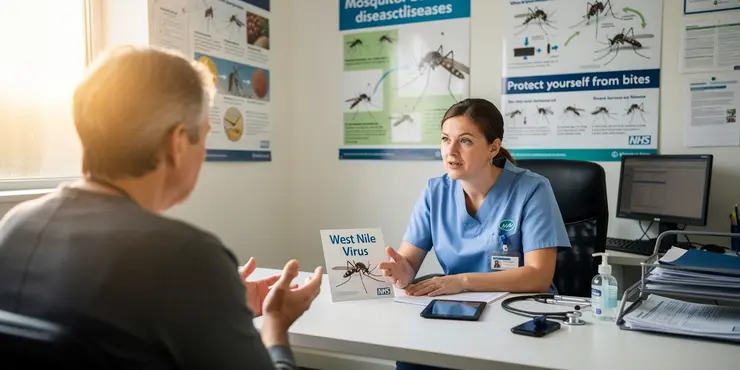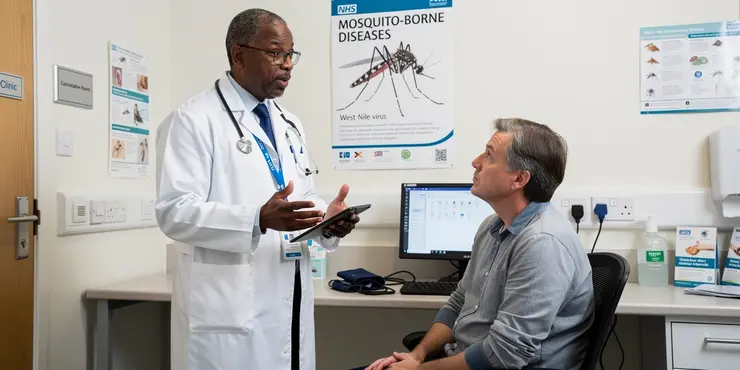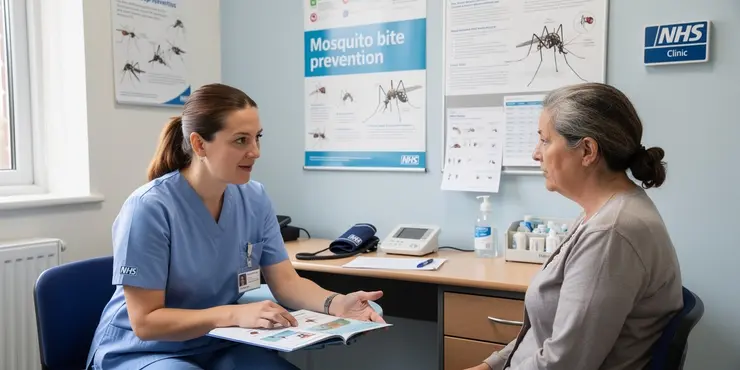
Find Help
More Items From Ergsy search
-

What is West Nile Virus?
Relevance: 100%
-

What is West Nile Virus?
Relevance: 99%
-

Is there a vaccine for West Nile Virus?
Relevance: 99%
-

Are there treatments for West Nile Virus?
Relevance: 98%
-

Is there a test for West Nile Virus?
Relevance: 98%
-

How is West Nile Virus transmitted?
Relevance: 96%
-

What are the symptoms of West Nile Virus?
Relevance: 95%
-

How prevalent is West Nile virus in the UK?
Relevance: 95%
-

Which countries are affected by West Nile Virus?
Relevance: 94%
-

Can pets get West Nile Virus?
Relevance: 93%
-

What should I do if I think I have West Nile Virus?
Relevance: 89%
-

How do health officials monitor West Nile Virus?
Relevance: 88%
-

Who is at risk for severe illness from West Nile Virus?
Relevance: 87%
-

How can West Nile Virus be prevented?
Relevance: 62%
-

Can mosquitoes carrying West Nile Virus be controlled?
Relevance: 61%
-

Can you get West Nile Virus more than once?
Relevance: 59%
-

What other viruses are tested for in blood donations?
Relevance: 49%
-

Are UK mosquitoes capable of transmitting Zika virus?
Relevance: 43%
-

What diseases are spread by mosquitos in the UK in 2025?
Relevance: 40%
-

When is West Nile Virus most active?
Relevance: 40%
-

Can West Nile Virus be transmitted from person to person?
Relevance: 35%
-

Is the Marburg virus related to the Ebola virus?
Relevance: 35%
-

What is the Ebola virus?
Relevance: 32%
-

Can West Nile Virus spread through blood transfusions or organ transplants?
Relevance: 31%
-
Do all mosquitoes in the UK carry diseases?
Relevance: 30%
-

What regions of the UK are most affected by mosquito-borne diseases?
Relevance: 27%
-

Is there a cure for Nipah Virus?
Relevance: 25%
-

What is Nipah Virus?
Relevance: 25%
-

What is the Marburg Virus?
Relevance: 25%
-

Is there a vaccine for Marburg virus?
Relevance: 25%
-

Is there a vaccine for the Zika virus?
Relevance: 25%
-

Is Zika virus present in the UK?
Relevance: 25%
-

How is the Zika virus transmitted?
Relevance: 24%
-

How is Nipah Virus diagnosed?
Relevance: 24%
-

How is the Marburg virus transmitted?
Relevance: 24%
-

How is Nipah Virus transmitted?
Relevance: 24%
-

Does the UK have Zika virus?
Relevance: 24%
-

How is Chikungunya virus transmitted?
Relevance: 24%
-

What are the symptoms of Zika virus?
Relevance: 24%
-

What symptoms should I watch for if I suspect a mosquito-borne disease?
Relevance: 24%
What is West Nile Virus?
West Nile Virus (WNV) is a mosquito-borne virus that belongs to the family Flaviviridae, which includes other well-known viruses such as dengue and Zika. While WNV is primarily found in Africa, Europe, the Middle East, and North America, it has been detected in other parts of the world due to global travel and migration of birds, which are natural hosts for the virus.
Transmission of West Nile Virus
The primary mode of transmission of West Nile Virus is through the bite of an infected mosquito. Mosquitoes become infected when they feed on birds that carry the virus. Infected mosquitoes, mostly from the Culex species, then transmit the virus to humans and other animals through their bites. It's important to note that the virus is not spread through casual human contact, such as touching, coughing, or sneezing. Other, less common, routes of transmission can include blood transfusions, organ transplants, and from mother to child during pregnancy, delivery, or breastfeeding.
Symptoms of West Nile Virus
Most people infected with West Nile Virus, about 8 in 10, do not develop any symptoms. When symptoms do appear, they usually occur within 2 to 14 days after being bitten by an infected mosquito. Mild symptoms include fever, headache, body aches, joint pains, vomiting, diarrhea, or rash. These symptoms usually last for a few days, and people typically recover completely, although fatigue and weakness can last for weeks or months. A small number of people, about 1 in 150, develop severe illness affecting the central nervous system such as encephalitis or meningitis. Symptoms of severe disease include high fever, neck stiffness, stupor, disorientation, coma, tremors, seizures, or paralysis.
Prevention and Control
There is currently no vaccine or specific antiviral treatment for West Nile Virus in humans. The best way to prevent the virus is to avoid mosquito bites. This can be achieved through the use of insect repellent, wearing long sleeves and trousers, and reducing time spent outdoors during peak mosquito hours from dusk to dawn. It is also helpful to ensure that windows and doors are fitted with screens to keep mosquitoes out and to eliminate standing water around properties where mosquitoes breed.
West Nile Virus in the UK
West Nile Virus is not endemic to the UK, and there have been no reported locally-acquired cases. However, with the increasing movement of people and animals across the globe, there is a potential risk for introduction. Health agencies in the UK actively conduct surveillance for mosquito-borne diseases to mitigate this risk. Travel advice includes taking precautions when visiting areas where WNV is known to be active.
What is West Nile Virus?
West Nile Virus is a sickness you can get from a mosquito bite. Mosquitoes are little flying bugs. The virus is like some other sicknesses called dengue and Zika. We usually see West Nile Virus in Africa, Europe, the Middle East, and North America. But because people and birds travel, it can be found in other places too. Birds can carry the virus but do not get sick from it.
How Does West Nile Virus Spread?
You can get West Nile Virus if a mosquito bites you. Mosquitoes get the virus when they bite birds who have it. Then, the mosquitoes can give the virus to people and animals. You cannot get the virus just by being near another person, or from touching, coughing, or sneezing. Other ways you could get the virus include blood transfusions, organ transplants, or from a mother to her baby during birth or breastfeeding, but this is very rare.
Signs of West Nile Virus
Most people who get the virus, about 8 out of 10, don't feel sick at all. If someone does get sick, it usually happens 2 to 14 days after a mosquito bite. Signs can be a fever, headache, body aches, joint pains, vomiting, diarrhea, or a rash. These are mild and go away in a few days. But some people can feel tired for weeks or months. A very small number of people, about 1 in 150, get very sick. This can hurt the brain or spinal cord and cause high fever, stiff neck, confusion, sleepiness, shaking, fits, or not being able to move parts of the body.
How to Stay Safe from West Nile Virus
There is no special medicine or vaccine for West Nile Virus. The best way to stay safe is to avoid mosquito bites. You can do this by using mosquito spray, wearing clothes that cover your arms and legs, and staying indoors when mosquitoes are most active, from evening to morning. Make sure windows and doors have screens to keep mosquitoes out, and get rid of any standing water where mosquitoes can lay eggs.
West Nile Virus in the UK
West Nile Virus is not usually found in the UK, and no one has caught it there. But because people and animals travel, there is a small chance it could come to the UK. Health workers in the UK are watching for diseases spread by mosquitoes. If you are traveling to a place where West Nile Virus is found, be sure to protect yourself from mosquito bites.
Frequently Asked Questions
What is West Nile Virus?
West Nile Virus is a mosquito-borne virus that can cause illness in humans, ranging from mild flu-like symptoms to severe neurological diseases.
How is West Nile Virus transmitted?
West Nile Virus is primarily transmitted to humans through the bite of an infected mosquito. Mosquitoes become infected when they feed on birds that carry the virus.
What are the symptoms of West Nile Virus?
Most people infected with West Nile Virus have no symptoms. Some develop mild symptoms such as fever, headache, body aches, joint pains, vomiting, diarrhea, or rash. Severe cases can include high fever, neck stiffness, stupor, disorientation, coma, tremors, seizures, or paralysis.
Can West Nile Virus be transmitted from person to person?
West Nile Virus is not transmitted from person to person. It is spread through infected mosquitoes.
How common is West Nile Virus?
West Nile Virus is common in Africa, Europe, the Middle East, and North America. Outbreaks can occur when conditions favor large mosquito populations.
Who is at risk for severe illness from West Nile Virus?
People over the age of 60, those with certain medical conditions such as cancer, diabetes, hypertension, kidney disease, and immunocompromised individuals are at greater risk for severe illness.
Are there treatments for West Nile Virus?
There is no specific treatment for West Nile Virus. Over-the-counter pain relievers can be used to reduce fever and alleviate some symptoms. Hospitalization may be required for severe cases.
How can West Nile Virus be prevented?
Preventing mosquito bites is the best way to prevent West Nile Virus. This includes using insect repellent, wearing long sleeves and pants, and eliminating standing water where mosquitoes breed.
Is there a vaccine for West Nile Virus?
Currently, there is no vaccine available for humans to prevent West Nile Virus.
Can pets get West Nile Virus?
Yes, animals such as horses and dogs can be infected with West Nile Virus, but it is rare and typically does not cause severe illness.
How do health officials monitor West Nile Virus?
Health officials track West Nile Virus through surveillance of mosquito populations, testing dead birds, and monitoring cases in humans and animals.
What should I do if I think I have West Nile Virus?
If you suspect you have symptoms of West Nile Virus, contact a healthcare provider, especially if you develop severe symptoms such as severe headaches or confusion.
Can you get West Nile Virus more than once?
It is rare, but possible, to be reinfected with West Nile Virus since immunity can wane over time.
When is West Nile Virus most active?
West Nile Virus is most active during mosquito season, which typically peaks in the summer and continues through fall.
Can West Nile Virus spread through blood transfusions or organ transplants?
Yes, West Nile Virus can spread through blood transfusions or organ transplants, but blood is screened for the virus to minimize this risk.
Is there a test for West Nile Virus?
Yes, West Nile Virus can be diagnosed through laboratory testing of blood or cerebrospinal fluid to detect the presence of antibodies or genetic material of the virus.
Which countries are affected by West Nile Virus?
West Nile Virus has been reported in Africa, Europe, the Middle East, North America, and parts of Asia.
Can mosquitoes carrying West Nile Virus be controlled?
Efforts to control mosquito populations, such as insecticide spraying and reducing breeding sites, can help reduce the spread of West Nile Virus.
What should communities do to prevent West Nile Virus outbreaks?
Communities should promote mosquito control measures, educate the public about prevention, and monitor for the presence of the virus.
How did West Nile Virus get its name?
West Nile Virus was first identified in the West Nile region of Uganda in 1937, which is how it got its name.
What is West Nile Virus?
West Nile Virus is a kind of germ that can make people sick.
It often spreads through bites from mosquitoes.
Most people don’t get very sick if they catch it.
Some people might get headaches, fever, or feel tired.
To learn more, you can use picture books or videos. Ask a grown-up if you have questions.
West Nile Virus is a sickness that comes from mosquitoes. It can make people feel sick. Some people might feel like they have the flu. Others can get very sick with problems in their brain.
If reading is hard, use tools like text-to-speech to hear the words. Pictures and videos about West Nile Virus can also help you understand better.
How do you get West Nile Virus?
You can get West Nile Virus from a mosquito bite. Mosquitoes are little flying bugs.
First, a mosquito bites a bird with the virus. Then, the mosquito bites a person.
It is important to protect yourself from mosquito bites. You can use bug spray or wear long clothes.
If you are not sure about something, ask an adult for help. Always stay safe!
West Nile Virus is spread to people by mosquito bites. Mosquitoes get the virus when they bite birds that have it.
What signs show you might have West Nile Virus?
West Nile Virus can make you feel sick.
Here are some things to look out for:
- Fever (feeling very hot)
- Headache (your head hurts)
- Body aches (your body feels sore)
- Sometimes, a skin rash (red spots on your skin)
- Feeling very tired
If you feel these things, tell a grown-up or see a doctor.
It can help to use a calendar. Write down how you feel each day.
Most people who get West Nile Virus don't feel sick. Some people might feel a little sick and get a fever, headache, sore muscles, sore joints, feel sick in their tummy, have diarrhea, or a rash on their skin. But sometimes, it can make people very sick. They might have a high fever, a stiff neck, feel confused, very sleepy, shaky, or even unable to move.
If you're worried, talk to a doctor. Reading tools, like text-to-speech, can help if you find reading hard.
Can West Nile Virus spread from one person to another?
No, West Nile Virus cannot spread from one person to another.
It spreads through bites from sick mosquitoes.
Here are helpful tips:
- Use mosquito spray.
- Wear long clothes to cover your arms and legs.
- Stay away from places with many mosquitoes.
You cannot catch West Nile Virus from another person. It comes from mosquito bites. These mosquitoes carry the virus.
To stay safe from mosquito bites, you can use bug spray, wear long clothes, and stay inside when there are lots of mosquitoes.
How many people get West Nile Virus?
West Nile Virus is a disease. It is found in Africa, Europe, the Middle East, and North America. Sometimes, many people get it when there are lots of mosquitoes.
Who can get very sick from West Nile Virus?
Some people can get very sick if they catch the West Nile Virus. Here is who needs to be careful:
- Older people. They need to be extra careful.
- People who already have health problems. They should talk to their doctor.
- People with weak bodies, like after being sick.
If you have questions, it is a good idea to ask a doctor or nurse. They can help explain more.
People who are older than 60 years are more likely to get very sick. People with some health problems like cancer, diabetes, high blood pressure, kidney disease, and those with weak immune systems are also more at risk.
It helps to have someone read with you. Using tools like text-to-speech can make reading easier.
Can you get help for West Nile Virus?
Yes, doctors can help you if you have West Nile Virus. You usually need rest and plenty of water.
If you feel very sick, you should see a doctor. They can give you medicine to help you feel better.
To help you remember important things, you can:
- Write down what your doctor tells you.
- Use a calendar to keep track of when to take your medicine.
- Ask someone you trust to help you understand.
There is no special medicine to cure West Nile Virus. You can take medicine that you buy at the store to help with pain and fever. If someone gets very sick, they might have to go to the hospital.
How can we stop West Nile Virus?
To stop West Nile Virus, you can use these helpful tips: - **Wear Long Clothes**: Put on long sleeves and pants to keep mosquito bites away. - **Use Bug Spray**: Spray bug spray on your skin and clothes. Look for one with DEET. - **Stay Inside at Dusk and Dawn**: Mosquitoes are busiest at these times. Try to stay inside then. - **Keep Windows and Doors Closed**: Use screens on windows and doors to keep mosquitoes out. - **Remove Standing Water**: Dump out water from things like buckets and flower pots. Mosquitoes lay eggs in water. For fun learning, try drawing pictures of these tips or using an app with games about mosquito safety.To stop mosquito bites and stay safe from West Nile Virus, follow these simple steps: Use bug spray. Wear clothes with long sleeves and long pants. Get rid of any still water where mosquitoes can grow.
Is there a shot to stop West Nile Virus?
No, there is no shot to stop West Nile Virus for people. But, there is a shot for horses.
It is good to wear long sleeves and pants to keep mosquito bites away. You can also use bug spray.
If you need help, ask a grown-up.
Right now, there is no shot to stop people from getting West Nile Virus.
Can pets catch West Nile Virus?
Yes, animals like horses and dogs can get West Nile Virus. But it is not common, and they usually do not get very sick.
How do health officials watch over West Nile Virus?
Health officials are people who make sure we stay healthy.
They watch over West Nile Virus to keep us safe.
Here’s how they do it:
- They look for mosquitoes that spread the virus.
- They check sick people and animals for signs of the virus.
- They tell everyone how to stay safe from mosquito bites.
- They share what they learn with other health workers.
If you want to learn more, you can use picture books, videos, or easy-read guides.
Health workers watch for West Nile Virus by looking at mosquito groups, testing birds that have died, and checking sickness in people and animals.
What to do if you think you have West Nile Virus
If you think you might have West Nile Virus, here’s what you should do:
- Tell an adult: Talk to a parent, teacher, or someone who can help you.
- See a doctor: A doctor can check if you have the virus and help you feel better.
- Rest: Make sure you get plenty of sleep and drink water.
- Stay calm: Most people get better without serious problems.
- Use a notebook or app: Write down how you feel, so you remember to tell the doctor.
If you feel very sick, it's important to get help quickly. Ask an adult to take you to the doctor or hospital.
If you think you might have West Nile Virus, talk to a doctor. This is very important if you feel very sick, like having a very bad headache or feeling mixed up and confused.
Can you catch West Nile Virus again?
Yes, you can catch West Nile Virus again. But it is very rare. Most people only get it one time. To stay safe, use bug spray and wear long sleeves and pants to keep mosquitoes away.
It's not common, but you can get West Nile Virus again. This happens because your body's protection can get weaker over time.
When is West Nile Virus most active?
West Nile Virus is a sickness that spreads through mosquito bites. It is most active in warm months, like summer. Mosquitoes like to come out when the weather is hot. This is when you need to be careful.
Helpful Tip: Wear long sleeves and pants to protect from mosquito bites. You can also use bug spray to keep mosquitoes away.
West Nile Virus spreads when there are lots of mosquitoes. This happens most in the summer and fall.
Can West Nile Virus spread through blood or organ donations?
Yes, West Nile Virus can sometimes spread through blood donations or organ transplants. This means if a person gets blood or an organ from someone who has the virus, they might get the virus too.
If you want to learn more, you can:
- Ask a doctor to explain it to you.
- Look for easy videos online about West Nile Virus.
- Use apps that read text aloud to help you understand better.
West Nile Virus can spread if you get blood or organ transplants from someone who has it. But doctors check for the virus to keep people safe.
Can you get tested for West Nile Virus?
Yes, doctors can find out if someone has West Nile Virus by testing their blood or a special liquid in their spine. They look for signs of the virus in these tests.
Which countries have West Nile Virus?
West Nile Virus has been found in Africa, Europe, the Middle East, North America, and some parts of Asia.
Can we stop mosquitoes with West Nile Virus?
Sometimes, mosquitoes have a virus called West Nile Virus. This can make people sick. We need to stop these mosquitoes.
Here are some ways to help:
- Use bug spray to keep them away.
- Wear clothes that cover your arms and legs.
- Put screens on windows and doors to keep mosquitoes out.
- Get rid of water in pots, tires, or buckets, because mosquitoes breed there.
These steps can help keep us safe from mosquitoes and the virus they carry.
We can fight the spread of West Nile Virus by getting rid of mosquitoes. We can do this by spraying insect spray and stopping mosquitoes from laying eggs in water puddles.
How can communities stop West Nile Virus from spreading?
Here are some simple steps communities can take:
- Get rid of standing water where mosquitoes breed, like in old tires, buckets, and puddles.
- Put screens on windows and doors to keep mosquitoes out.
- Wear long sleeves and pants when outside, especially at dawn and dusk.
- Use mosquito repellent on skin and clothes.
- Tell everyone to keep their yards clean and free of still water.
Communities can work together to remind each other and help out. Using pictures or videos can be a good way to share these steps with everyone.
Communities need to help stop mosquitoes. They should teach people how to stay safe and check if the virus is around.
Where did the name West Nile Virus come from?
The name "West Nile Virus" comes from a place in Africa called the West Nile region. Scientists first found the virus there.
Tip: If you find reading hard, try using pictures to help understand words.
West Nile Virus got its name because it was first found in the West Nile area of Uganda in 1937.
Useful Links
This website offers general information and is not a substitute for professional advice.
Always seek guidance from qualified professionals.
If you have any medical concerns or need urgent help, contact a healthcare professional or emergency services immediately.
Some of this content was generated with AI assistance. We’ve done our best to keep it accurate, helpful, and human-friendly.
- Ergsy carfully checks the information in the videos we provide here.
- Videos shown by Youtube after a video has completed, have NOT been reviewed by ERGSY.
- To view, click the arrow in centre of video.
- Most of the videos you find here will have subtitles and/or closed captions available.
- You may need to turn these on, and choose your preferred language.
- Go to the video you'd like to watch.
- If closed captions (CC) are available, settings will be visible on the bottom right of the video player.
- To turn on Captions, click settings .
- To turn off Captions, click settings again.
More Items From Ergsy search
-

What is West Nile Virus?
Relevance: 100%
-

What is West Nile Virus?
Relevance: 99%
-

Is there a vaccine for West Nile Virus?
Relevance: 99%
-

Are there treatments for West Nile Virus?
Relevance: 98%
-

Is there a test for West Nile Virus?
Relevance: 98%
-

How is West Nile Virus transmitted?
Relevance: 96%
-

What are the symptoms of West Nile Virus?
Relevance: 95%
-

How prevalent is West Nile virus in the UK?
Relevance: 95%
-

Which countries are affected by West Nile Virus?
Relevance: 94%
-

Can pets get West Nile Virus?
Relevance: 93%
-

What should I do if I think I have West Nile Virus?
Relevance: 89%
-

How do health officials monitor West Nile Virus?
Relevance: 88%
-

Who is at risk for severe illness from West Nile Virus?
Relevance: 87%
-

How can West Nile Virus be prevented?
Relevance: 62%
-

Can mosquitoes carrying West Nile Virus be controlled?
Relevance: 61%
-

Can you get West Nile Virus more than once?
Relevance: 59%
-

What other viruses are tested for in blood donations?
Relevance: 49%
-

Are UK mosquitoes capable of transmitting Zika virus?
Relevance: 43%
-

What diseases are spread by mosquitos in the UK in 2025?
Relevance: 40%
-

When is West Nile Virus most active?
Relevance: 40%
-

Can West Nile Virus be transmitted from person to person?
Relevance: 35%
-

Is the Marburg virus related to the Ebola virus?
Relevance: 35%
-

What is the Ebola virus?
Relevance: 32%
-

Can West Nile Virus spread through blood transfusions or organ transplants?
Relevance: 31%
-
Do all mosquitoes in the UK carry diseases?
Relevance: 30%
-

What regions of the UK are most affected by mosquito-borne diseases?
Relevance: 27%
-

Is there a cure for Nipah Virus?
Relevance: 25%
-

What is Nipah Virus?
Relevance: 25%
-

What is the Marburg Virus?
Relevance: 25%
-

Is there a vaccine for Marburg virus?
Relevance: 25%
-

Is there a vaccine for the Zika virus?
Relevance: 25%
-

Is Zika virus present in the UK?
Relevance: 25%
-

How is the Zika virus transmitted?
Relevance: 24%
-

How is Nipah Virus diagnosed?
Relevance: 24%
-

How is the Marburg virus transmitted?
Relevance: 24%
-

How is Nipah Virus transmitted?
Relevance: 24%
-

Does the UK have Zika virus?
Relevance: 24%
-

How is Chikungunya virus transmitted?
Relevance: 24%
-

What are the symptoms of Zika virus?
Relevance: 24%
-

What symptoms should I watch for if I suspect a mosquito-borne disease?
Relevance: 24%


